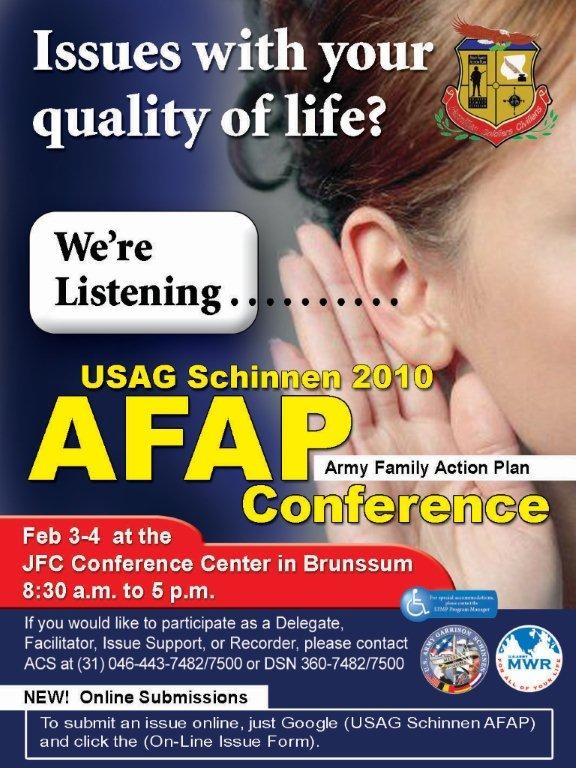SCHINNEN, Netherlands - What works' What doesn't' The Army Family Action Plan, or AFAP as it's commonly known, has been tackling those tough issues for more than 25 years, often generating solutions that benefit all the Armed Services through conferences held worldwide. This year's Tri-Border AFAP conference takes place Feb. 3 to 4, hosted by USAG Schinnen at the JFC Conference Center in Brunssum, Netherlands.
AFAP Conferences bring together groups of service members, family members, civilian employees, retirees and military leaders to identify issues impacting their communities. The groups prioritize the issues and tackle the toughest ones, offering suggestions that often evolve into solutions. The issues and suggestions pass to senior leaders who frequently use the feedback to produce tangible improvements at local installations.
About 90% of AFAP issues are resolved at local levels, according to Jennifer Partridge, USAG Schinnen AFAP Coordinator, but some issues trigger review at much higher levels, resulting in military-wide policy revisions that affect all military families. The policy on military spouse hiring preference is one example.
A suggestion to revise that hiring policy grew out of last year's Tri-Border AFAP and was later selected as one of two European issues forwarded to the Department of the Army, where it is currently under review. The outcome could impact military spouses around the globe.
Partridge notes that over 60% of the active AFAP issues, which rise to the Department of Army level, produce outcomes that impact all the services. In addition to the military spouse hiring policy currently under review, she cites previous AFAP issues on military pay, education benefits, school liaison officers and survivor benefits that resulted in positive changes for all the military services in recent years.
Elevating an issue like the military spouse hiring preference to the Department of the Army "shows how much your input really does matter in bringing about positive improvements in our military communities," Partridge said. "The Tri-Border AFAP, coming up in February, is another opportunity to let your voice be heard."
Anyone from the Tri-Border military communities of Belgium, Germany and the Netherlands may submit an issue and/or participate in the conference. In advance of the February conference, Partridge and her AFAP team plan mini-AFAP conferences at various locations, including Rheindahlen, Germany; Rotterdam, Netherlands and AFNORTH International School, Brunssum, Netherlands, to ensure that all sectors of the Tri-Border are represented.
To submit an issue, look for issue boxes located around the Tri-Border area or click "online submissions" in the links provided with this story. "Even if you can't attend the conference, we want to hear from you. The online submission option makes it possible for anybody to submit an issue," Partridge stresses. Submissions can be anonymous as no emails are forwarded.
AFAP organizers are also seeking volunteers to serve as delegates, facilitators, recorders, and issue support. Limited child care is available for conference participants. Contact the AFAP Program Manager for more information: 0031-46-443-7482/7500.
Related Links:
AFAP Conference Planned for Tri-Border (January 31, 2009)




Social Sharing